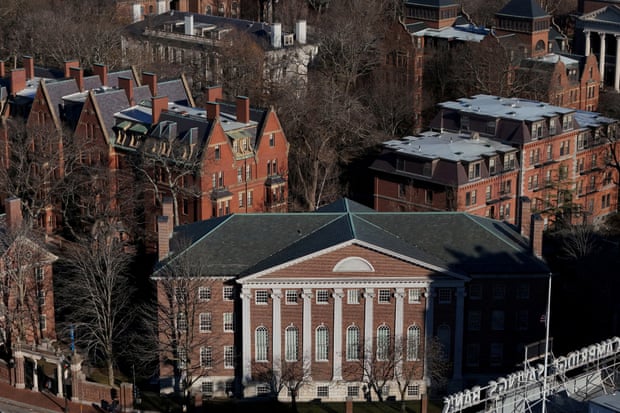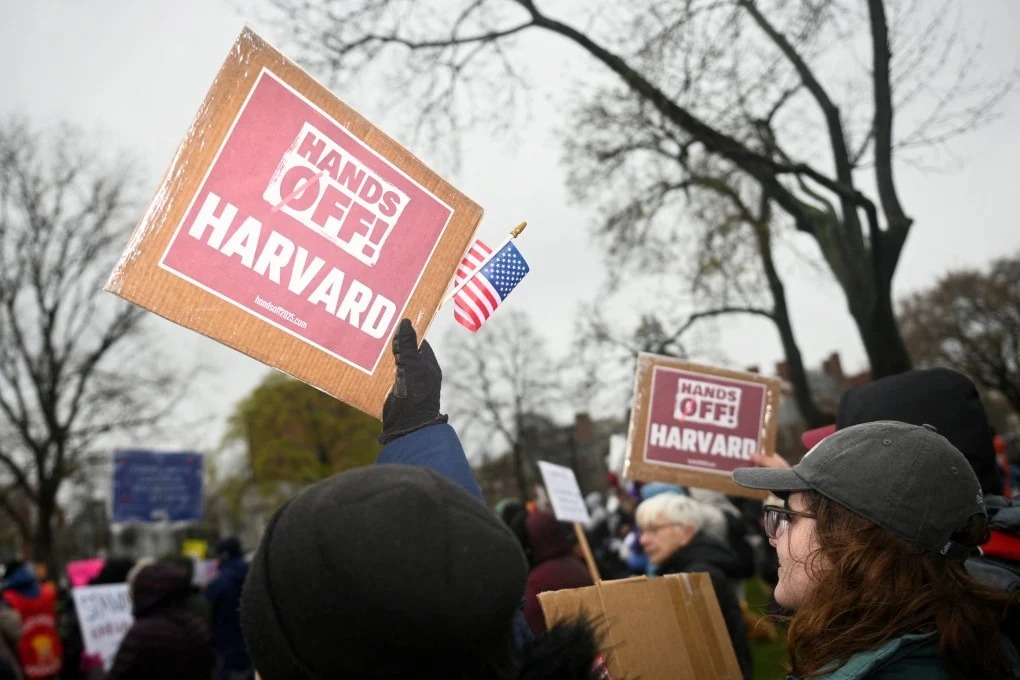
Harvard University in Cambridge, Massachusetts, on 12 December 2023. Photograph: Brian Snyder/Reuters
Harvard University professors are suing to block the Trump administration’s review of nearly $9bn in federal contracts and grants awarded to the Ivy League school as part of a crackdown on what the White House says is antisemitism on college campuses.
The Harvard faculty chapter of the American Association of University Professors and the national arm of the academic organization said in a lawsuit filed on Friday in a Boston federal court that the administration was trying to unlawfully undermine academic freedom and free speech on the school’s campus.
“Threats like these are an existential ‘gun to the head’ for a university,” the lawsuit said, according to the Harvard Crimson. It added: “They overtly seek to impose on Harvard University political views and policy preferences advanced by the Trump administration and commit the University to punishing disfavored speech.”
The lawsuit, which was filed alongside a motion for a temporary restraining order, alleges that the federal government’s review of the university’s funding was “arbitrary or capricious” because it did not provide a reasoned explanation for threatening to withdraw the funds.
The US Department of Justice, which is defending the administration’s policies in court, did not respond to a request for comment on Saturday. Harvard, based in Cambridge, Massachusetts, declined to comment.
Several elite universities including Harvard have seen their federal funding threatened by Donald Trump’s administration over pro-Palestinian campus protests as well as other issues such as diversity, equity and inclusion programs and transgender policies.
The departments of Education and Health and Human Services, along with the US General Services Administration, on 31 March said that $255.6m in contracts among Harvard, its affiliates and the federal government were being reviewed, along with $8.7bn in multiyear grant commitments.
In a subsequent letter, those agencies demanded Harvard meet numerous conditions to continue receiving federal funds, including banning the use of masks, eliminating DEI programs and agreeing to cooperate with law enforcement agencies.

Many pro-Palestinian protesters have worn masks during demonstrations. The letter also said Harvard must review and make changes to programs and departments that “fuel antisemitic harassment” and hold students accountable for policy violations.
The administration has cited its authority to enforce Title VI of the 1964 Civil Rights Act, an anti-discrimination law covering institutions that receive federal funding.
But the lawsuit alleged the administration had failed to follow the statute’s requirements in seeking to cut off funding and that its actions violated free speech rights enshrined in the US constitution’s first amendment.
“These tactics amount to exploiting Title VI to coerce universities into undermining free speech and academic inquiry in service of the government’s political or policy preferences,” the lawsuit said, as reported by the Harvard Crimson.
“The First Amendment does not permit government officials to use the power of their office to silence critics and suppress speech they don’t like,” Andrew Crespo, a Harvard law professor and general counsel to the school’s AAUP chapter, said in a statement.
Echoing similar sentiments, Nikolas Bowie, secretary-treasurer of the university’s AAUP chapter law professor, said: “Eliminating discrimination and protecting all students is important. But Trump is defying the Civil Rights Act, terrifying students, and illegally holding hostage grants for hospitals and scientific research so he can accomplish his real goal of punishing academics for our politics.”
The latest lawsuit follows the Republican-led House education and workforce committee’s withdrawal of an investigation into Northwestern University’s law school clinics after professors there sued, alleging that the inquiry violated their constitutional free speech rights.
Citing reports of antisemitism on campus, House committee members had sought budget and personnel records over claims that the university was using “taxpayer-supported institutional resources for troubling purposes”.
In response, Sheila A Bedi, a clinical professor of law, and Lynn Cohn, a fellow law professor, sued the committee, asserting that its investigation violated their and their clients’ constitutional rights to free speech and due process, among others.
The committee subsequently withdrew its request, a move that a Thursday press release from the Center for Constitutional Rights described as a “victory for academic freedom, the rule of law, and bedrock constitutional principles”.

